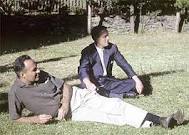Making Lemonade In The Maiatico Building–Part 5
Scratch any RPCV or PCV and they’ll tell you the three goals of the Peace Corps. While the wording varies from one publication to the next, these are the goals: (1) Contribute to the development of critical countries and regions; (2) Promote international cooperation and goodwill toward the country; (3) Contribute to the education of America and to more intelligent American participation in the world. Now, those are the stated goals, and I know that they have been tweaked with by staff and PCVs over the last 50 years. For example, “living at the level of the HCNs” is often stated as Goal # 2.
But the question is, who came up with these goals and why three? Well, at the famous Mayflower Hotel in the winter months of 1961 when the task force of Shriver/Wofford/Wiggins/Josephson and a handful of others began to draft the proposal to give JFK that would define what “Peace Corps” was, a clear statement of purpose was needed.
Harris Wofford goes into this at length in his book Of Kennedys and Kings that there were many long discussions [arguments?] of how to state the reason for the new agency.
Some members of the task force wanted a single purpose, or at least a central one. “Peace” was the overriding purpose, and as many as a dozen “purposes” were argued about, until Shriver sat down and wrote out three Goals that we have today. Now ‘the Peace Corps’ could have been something else. Bu what Shriver and the others wanted with a new form of overseas work, volunteers who would not be missionaries, business representatives, government officials, intelligence agent, or researchers. Nor would they be high-level experts or advisers. Peace Corps Volunteers would be different. They would go with a different purpose, operate in a different relationship to their host country colleagues, and presumably return with a different view of the developing world.
Volunteers would break the pattern of government aid experts, as Wofford wrote in his book. There was a common story told then about American advisors that made Wofford’s point.
When the prize American bull, sent by the U.S. aid program, was put in the pasture with the cows, he just looked around. When asked why he didn’t do something, the bull replied, “I’m an adviser.”
I can say with confidence that was not how PCVs operated overseas.

No comments yet.
Add your comment